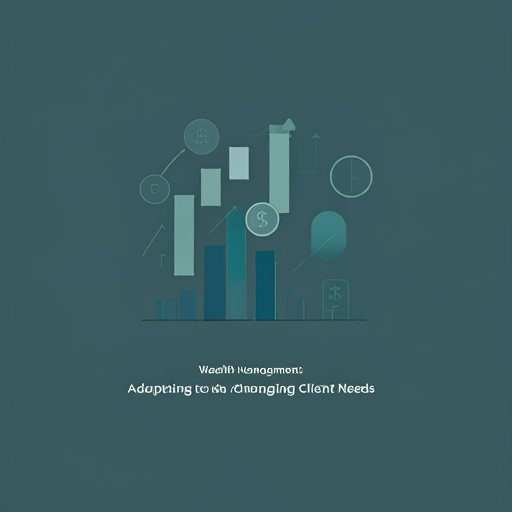Introduction to Wealth Management in the Cryptocurrency Era
The Evolution of Wealth Management
Wealth management has undergone significant transformation with the advent of cryptocurrency. Financial advisors now integrate digital assets into diversified portfolios. This shift reflects changing client preferences and the demand for innovative investment strategies. Many investors seek exposure to cryptocurrencies for potential high returns. It’s an exciting time for the industry. The landscape is evolving rapidly.
Impact of Cryptocurrency on Traditional Wealth Management
Cryptocurrency has introduced new dynamics to traditional wealth management. Financial advisors must now consider digital assets alongside conventional investments. This integration requires a reevaluation of risk assessment and porrfolio diversification strategies.
Key impacts include:
These factors challenge existing frameworks. Advisors face a steep learning curve. Adapting to these changes is crucial for success.
Understanding Client Needs in a Digital Age
Shifts in Client Demographics
Client demographics are shifting significantly in the digital age. Younger generations increasingly seek personalized skincare solutions. This trend necessitates a deeper understanding of their unique needs.
Key shifts include:
These factors influence purchasing decisions. Clients are more informed than ever. They expect tailored advice and effective results.
Changing Attitudes Towards Risk and Investment
Attitudes towards risk and investment are evolving rapidly. Clients now prioritize safety and efficacy in skincare products. This shift reflects a broader trend towards informed decision-making.
Key considerations include:
Clients are more cautious with their choices. They seek transparency and accountability. This change is reshaping the skincare market.
Integration of Cryptocurrency into Wealth Management Strategies
Asset Allocation and Diversification
Effective asset allocation is crucial in wealth management. Incorporating cryptocurrency can enhance diversification strategies. This approach mitigates risks associated with traditional assets.
Key benefits include:
Investors must assess their risk tolerance. He should consider market volatility. A balanced portfolio is essential for stability.
Tax Implications and Regulatory Considerations
Tax implications of cryptocurrency investments are significant. Investors must understand capital gains taxes on trades. This understanding is essential for compliance.
Key considerations include:
Regulatory frameworks are still evolving. He should stay informed about changes. Awareness is crucial for effective tax planning.
Technological Innovations Shaping Wealth Management
Blockchain Technology and Its Applications
Blockchain technology offers transformative potential in various sectors. Its applications extend to supply chain transparency and product authenticity. This innovation enhances trust between consumers and brands.
Key benefits include:
Clients increasingly value transparency in skincare products. They seek assurance about ingredient sourcing. Blockchain can provide that clarity.
Robo-Advisors and Automated Investment Solutions
Robo-advisors are revolutionizing investment management. They utilize algorithms to create personalized portfolios. This automation reduces costs and increases accessibility.
Key advantages include:
Clients benefit from lower fees and transparency. They can access sophisticated tools easily. This technology is reshaping the investment landscape.
Client Education and Engagement
Building Trust Through Transparency
Transparency is essential for building client cartel. Clear communication about investment strategies fosters confidence. Clients are more likely to engage when they understand processes.
Key elements include:
Educating clients enhances their decision-making capabilities . They appreciate honesty and straightforwardness. This approach strengthens long-term relationships.
Resources for Client Education on Cryptocurrency
Educating clients about cryptocurrency is vital for informed decisions. Comprehensive resources enhance understanding of digital assets.
Key resources include:
These tools provide valuable insights into market dynamics. Clients gain confidence through knowledge. He should utilize these resources effectively.
Future Trends in Wealth Management
Emerging Investment Opportunities
Emerging investment opportunities are reshaping wealth management. Innovations in biotechnology and sustainable energy are gaining traction. These sectors promise significant growth potential.
Key trends include:
Investors are seeking long-term value. He should consider these sectors carefully. They offer unique advantages and risks.
Predictions for the Next Decade
Predictions for the next decade indicate significwnt shifts in wealth management. Technological advancements will drive greater efficiency and accessibility. Automation and artificial intelligence will enhance decision-making processes.
Key expectations include:
Investors will demand more personalized services. He should prepare for these changes. Adaptability will be crucial for success.
Conclusion: Embracing Change in Wealth Management
Strategies for Adapting to Client Needs
Adapting to client needs requires a proactive approach. Financial advisors must stay informed about market trends. This knowledge enables them to offer relevant advice.
Key strategies include:
Clients appreciate tailored solutions. He should prioritize their unique concerns. Building strong relationships is essential for success.
The Role of Financial Advisors in a Crypto-Driven Market
Financial advisors play a crucial role in a crypto-driven market. They must educate clients about the complexities of digital assets. This guidance helps clients navigate volatility and risks.
Key responsibilities include:
Clients rely on their expertise for informed decisions. He should foster trust through transparency. Effective communication is vital for success.

Leave a Reply